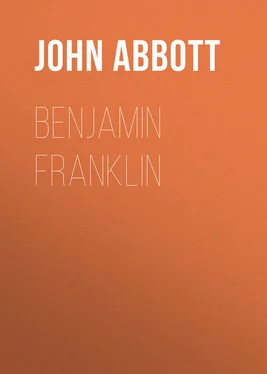John Abbott - Benjamin Franklin
Здесь есть возможность читать онлайн «John Abbott - Benjamin Franklin» — ознакомительный отрывок электронной книги совершенно бесплатно, а после прочтения отрывка купить полную версию. В некоторых случаях можно слушать аудио, скачать через торрент в формате fb2 и присутствует краткое содержание. Жанр: foreign_antique, foreign_prose, на английском языке. Описание произведения, (предисловие) а так же отзывы посетителей доступны на портале библиотеки ЛибКат.
- Название:Benjamin Franklin
- Автор:
- Жанр:
- Год:неизвестен
- ISBN:нет данных
- Рейтинг книги:3 / 5. Голосов: 1
-
Избранное:Добавить в избранное
- Отзывы:
-
Ваша оценка:
- 60
- 1
- 2
- 3
- 4
- 5
Benjamin Franklin: краткое содержание, описание и аннотация
Предлагаем к чтению аннотацию, описание, краткое содержание или предисловие (зависит от того, что написал сам автор книги «Benjamin Franklin»). Если вы не нашли необходимую информацию о книге — напишите в комментариях, мы постараемся отыскать её.
Benjamin Franklin — читать онлайн ознакомительный отрывок
Ниже представлен текст книги, разбитый по страницам. Система сохранения места последней прочитанной страницы, позволяет с удобством читать онлайн бесплатно книгу «Benjamin Franklin», без необходимости каждый раз заново искать на чём Вы остановились. Поставьте закладку, и сможете в любой момент перейти на страницу, на которой закончили чтение.
Интервал:
Закладка:
1. “Have you met with anything in the author you last read?
3. “Has any citizen in your knowledge failed, and have you heard the cause?
7. “What unhappy effects of intemperance have you lately observed?
12. “Has any deserving stranger arrived in town since your last meeting?
16. “Has anybody attacked your reputation lately?
23. “Is there any difficulty which you would gladly have discussed at this time?”
Debates, declamation, and the reading of essays added to the entertainment of these gatherings. Stories were told, and bacchanal songs sung. No man could tell a better story, and few men could sing a better song than Benjamin Franklin. No one was deemed a suitable member of the club, who would not contribute his full quota to the entertainment or instruction. The questions proposed by Franklin for discussion, developed the elevated intellectual region his thoughts were accustomed to range. We give a few as specimens.
“Can any one particular form of government suit all mankind?
“Should it be the aim of philosophy to eradicate the passions?
“Is perfection attainable in this life?
“What general conduct of life is most suitable for men in such circumstances as most of the members of the Junto are?”
The Junto was limited to twelve members. It soon became so popular that applications for admission became very frequent. Six months passed rapidly away, when Keimer, who was an exceedingly immoral and worthless man, and was fast going to ruin, in some fit of drunkenness, or ungovernable irritation, entered the office, and assailed Franklin with such abuse, that he took his hat, and repaired to his lodgings, resolved never to return.
Franklin was twenty-one years of age. He had laid up no money. He was still but a journeyman printer. The draft which he had received from Mr. Vernon for fifty dollars had not yet been paid. He was exceedingly mortified when he allowed himself to reflect upon this delinquency which certainly approached dishonesty. In this emergence he conferred with a fellow journeyman by the name of Hugh Meredith, whose father was a gentleman of considerable property. Meredith proposed that they should enter into partnership, he furnishing the funds, and Franklin the business capacity.
At that time Franklin, remembering his narrow escape from the grave by the pleurisy, wrote his own epitaph which has been greatly celebrated. It has generally been admired; but some of more sensitive minds perceive in it a tone which is somewhat repulsive.
“The Body of
Benjamin Franklin,
Printer ,
(Like the cover of an old book,
Its contents torn out,
And stripped of its lettering and gilding,)
Lies here, food for worms.
Yet the work itself shall not be lost,
For it will, as he believed, appear once more,
In a new
And more beautiful edition,
Corrected and amended
By
The Author.”
The excellencies of Franklin did not run in the line of exquisite sensibilities. At the early age of fifteen he began to cast off the restraints of the religion of his father and mother. Nearly all his associates were what were called Free-thinkers. He could not be blind to their moral imperfections. Mr. Parton writes,
“His old friend Collins, he remembered, was a Free-thinker, and Collins had gone astray. Ralph was a Free-thinker, and Ralph was a great sinner. Keith was a Free-thinker, and Keith was the greatest liar in Pennsylvania. Benjamin Franklin was a Free-thinker, and how shamefully he had behaved to Ralph’s mistress, to Mr. Vernon and Miss Read, whose young life had been blighted through him.” 10 10 Parton’s Life of Franklin, Vol. I, p. 168.
Franklin’s creed thus far, consisted only of negations. He had no belief; he had only unbelief. Indeed he seems to have become quite ashamed of his treatise upon Liberty and Necessity, published in London, and felt constrained to write a refutation of it. 11 11 “My arguments perverted some others, especially Collins and Ralph. But each of these having wronged me greatly without the least compunction; and recollecting Keith’s conduct towards me, who was another Free-thinker, and my own towards Vernon and Miss Read, which at times gave me great trouble, I began to suspect that this doctrine, though it might be true, was not very useful. My London pamphlet, printed in 1725, and which had for its motto, “‘Whatever is is right,’ and which from the attributes of God, His infinite wisdom, goodness and power, concluded that nothing could possibly be wrong in the world, and that vice and virtue were empty distinctions, no such things existing, appeared now not so clever a performance, as I once thought it; and I doubted whether some error had not insinuated itself unperceived into my argument.” In the year 1779, Dr. Franklin wrote to Dr. Benjamin Vaughn respecting this pamphlet. “There were only one hundred copies printed, of which I gave a few to friends. Afterwards, disliking the piece, I burnt the rest, except one copy. I was not nineteen years of age when it was written. In 1730, I wrote a piece on the other side of the question, which began with laying for its foundation that almost all men, in all ages and countries, have at times made use of prayer. “Thence I reasoned that if all things are ordained, prayer must be among the rest ordained; but as prayer can procure no change in things that are ordained, praying must then be useless and an absurdity. God would, therefore, not ordain praying if everything else was ordained. But praying exists, therefore all other things are not ordained. This manuscript was never printed. The great uncertainty I found in metaphysical reasoning disgusted me, and I quitted that kind of reading and study for others more satisfactory.” – Autobiography, p. 76.
As this strange young man in his discontent looked over the religions of the world, he could find no one that met his views. He therefore deliberately and thoughtfully sat down to form a religion of his own. Many such persons have appeared in the lapse of the ages, and almost invariably they have announced their creeds with the words, “Thus saith the Lord.” But our young printer of twenty-two years, made no profession whatever, of any divine aid. He simply said, “Thus saith my thoughts.” One would think he could not have much confidence in those thoughts, when it is remembered that at this time he was writing a refutation of the opinions, which he had published in London but a few months before.
The book which Franklin thus prepared was entitled “Articles of Belief, and Acts of Religion.” His simple creed was that there was one Supreme God who had created many minor gods; that the supreme God was so great that he did not desire the worship of man but was far above it.
The minor gods are perhaps immortal, and perhaps after the ages lapse they are changed, others supplying their place. Each of these subordinate gods has created for himself a sun with its planetary system, over which he presides and from the inhabitants of which he expects adoration. He writes,
“It is that particular wise and good God, who is the author and owner of our system that I propose for the object of my praise and adoration. It is to be inferred that this God is not above caring for us, is pleased with our praise, and offended when we slight him.”
He then prepares an invocation to this god of our solar system. It is founded on the style of the Psalms, but is immeasurably inferior to most of those sublime utterances of the Psalmist of Israel. And still the sentiments breathed were ennobling in their character; they proved that Franklin was vastly superior to the thoughtless, reckless deists who surrounded him, and that his soul was reaching forth and yearning for higher and holier attainments. In this invocation, the whole of which we cannot quote, he writes,
Читать дальшеИнтервал:
Закладка:
Похожие книги на «Benjamin Franklin»
Представляем Вашему вниманию похожие книги на «Benjamin Franklin» списком для выбора. Мы отобрали схожую по названию и смыслу литературу в надежде предоставить читателям больше вариантов отыскать новые, интересные, ещё непрочитанные произведения.
Обсуждение, отзывы о книге «Benjamin Franklin» и просто собственные мнения читателей. Оставьте ваши комментарии, напишите, что Вы думаете о произведении, его смысле или главных героях. Укажите что конкретно понравилось, а что нет, и почему Вы так считаете.









![Benjamin Franklin - Memoirs of Benjamin Franklin; Written by Himself. [Vol. 2 of 2]](/books/747975/benjamin-franklin-memoirs-of-benjamin-franklin-wr-thumb.webp)
![Benjamin Franklin - Memoirs of Benjamin Franklin; Written by Himself. [Vol. 1 of 2]](/books/748053/benjamin-franklin-memoirs-of-benjamin-franklin-wr-thumb.webp)

